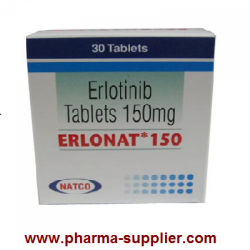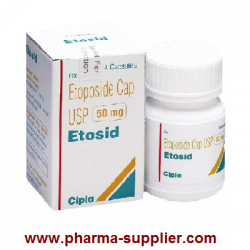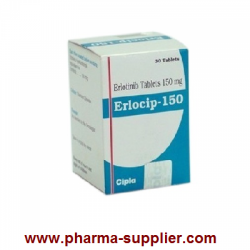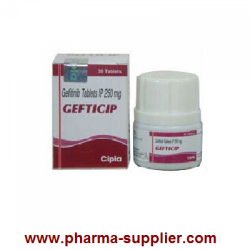Lung cancer
What is Geftinat (Gefitinib 250mg Tablets)?
Geftinat (Gefitinib 250mg Tablets) containing the active ingredient gefitinib is considered a tyrosine kinase inhibitor type of medication. The medication works by blocking the action of certain natural substances to prevent cancer cells from multiplying and spreading. The tablets should be taken when other drugs have proven to be ineffective in the treatment of non small cell lung cancer.
Geftinat (Gefitinib 250mg Tablets) works
Geftinat (Gefitinib 250mg Tablets) blocks a protein called ‘epidermal growth factor receptor’ (EGFR) which is involved in the growth and spread of cancer cells.
How is Geftinat (Gefitinib 250mg Tablets) used?
Geftinat (Gefitinib 250mg Tablets) is usually taken orally once per day or as directed by a doctor. The medication can be taken with or without food but should be taken along with a glass of water. Dosage and length of treatment will depend on the patient's condition and their response to the therapy, contact a doctor for the correct dosage. Should the patient experience difficulty swallowing the tablets whole, it may be dropped into a glass of water, allowed to disperse in the water for about 10 minutes, stirred and taken as a liquid.
Geftinat (Gefitinib 250mg Tablets) Side effects:
Vomiting, dizziness, headache, constipation, nausea, diarrhea, and rash are the common side effects of Gefitinib. If any of these effects continuing for a long time or the condition become uncontrolled, contact your doctor immediately.
Geftinat (Gefitinib 250mg Tablets) may rarely cause serious side effects such as:blurred vision, chest pain, new or worsening cough with fever, tiredness, loss of appetite, upper stomach pain, bloody stools, dark urine, jaundice, severe skin reactions.
Geftinat (Gefitinib 250mg Tablets) Warnings
While using the medication the doctor may request frequent blood tests to check your liver function.
Immediately proceed to your nearest emergency department if you suffer an allergic reaction. Symptoms usually associated with such a reaction include difficulty breathing or swallowing, chest tightness, swelling, skin rashes, and hives.
Geftinat (Gefitinib 250mg Tablets) is not always suitable for all patients. Always consult your health care provider prior to using this medication if you are pregnant, breastfeeding, trying to conceive, using any other medication (prescription or non-prescription), using any herbal products or supplements, or if you have any allergies or other health problems.
The correct dosage and prescription commonly depend on the patient and the condition being treated. Do not adjust your dosage without the approval of your health care provider. This product is only for use as prescribed and instructed.
Geftinat (Gefitinib 250mg Tablets) Overdosage:
Symptoms of a Geftinat (Gefitinib 250mg Tablets) overdose tend to be similar to side effects caused by the medication, although often more severe. If you suspect over dose seek emergency medical attention or contact your healthcare provider immediately.
Geftinat (Gefitinib 250mg Tablets) Contraindications
Geftinat (Gefitinib 250mg Tablets) is contraindicated in patients with severe hypersensitivity to gefitinib or to any other component of gefitinib.
Gefticip (Gefitinib 250mg Tablets)
Gefticip (Gefitinib 250mg Tablets) is used in the treatment of lung cancer. It helps to treat non-small-cell lung cancer by blocking the action of an enzyme known as tyrosine kinase. This enzyme is believed to be needed by the cancer cells to multiply, so by interfering with its function the medication helps to prevent the growth of cancer cells and slow down their ability to spread throughout the lungs and beyond.
Uses Gefticip (Gefitinib 250mg Tablets)?
Gefticip (Gefitinib 250mg Tablets) is taken orally, and washed down with a full glass of water. It may be taken either on an empty stomach or alongside a meal or snack. Patients taking this medication normally require frequent blood tests during the course of their treatment, and you should always attend all appointments for tests and checkups. This medication should only be taken as directed by your physician. Patients should always take the exact dose prescribed to them, and ensure that they do not miss any doses.
Gefticip (Gefitinib 250mg Tablets) works
Gefticip (Gefitinib 250mg Tablets) blocks a protein called ‘epidermal growth factor receptor’ (EGFR) which is involved in the growth and spread of cancer cells.
Side Effects of Gefticip (Gefitinib 250mg Tablets)?
Some side effects have been reported by patients taking Gefticip (Gefitinib 250mg Tablets) and these include mild nausea, fatigue, acne, and hair loss. Consult your physician immediately if you notice any of the following rare but serious side effects:
- Coughing up blood or blood visible in urine
- Bloody or black stools
- Eye pain
- Fever
- Difficulty breathing
Gefticip (Gefitinib 250mg Tablets) Dosage and Administration
The recommended daily dose of Gefticip (Gefitinib 250mg Tablets) is one 250 mg tablet with or without food. Higher doses do not give a better response and cause increased toxicity. If a dose of Gefticip (Gefitinib 250mg Tablets) is missed, it should be taken as soon as the patient remembers. If it is less than 12 hours to the next dose, the patient should not take the missed dose. Patients should not take a double dose (two doses at the same time) to make up for a forgotten dose.
Gefticip (Gefitinib 250mg Tablets) Dosage Adjustment
- Patients with poorly tolerated diarrhoea (sometimes associated with dehydration) or skin adverse drug reactions may be successfully managed by providing a brief (up to 14 days) therapy interruption followed by reinstatement of the 250 mg daily dose.
- In the event of acute onset or worsening of pulmonary symptoms (dyspnoea, cough, fever), Gefticip (Gefitinib 250mg Tablets) therapy should be interrupted and a prompt investigation of these symptoms should occur and appropriate treatment initiated. If interstitial lung disease (ILD) is confirmed, Gefticip (Gefitinib 250mg Tablets) should be discontinued and the patient treated appropriately.
- Patients who develop an onset of eye symptoms such as pain should be medically evaluated and managed appropriately, including interruption of Gefticip (Gefitinib 250mg Tablets) therapy and removal of an aberrant eyelash, if present. After the symptoms and eye changes have resolved, the decision should be made concerning reinstatement of the 250 mg daily dose.
- In patients receiving a potent CYP3A4 inducer such as rifampicin or phenytoin, a dose increase to 500 mg daily should be considered in the absence of severe adverse drug reactions, and clinical response and adverse events should be carefully monitored.
- No dosage adjustment is required on the basis of patient age, body weight, gender, ethnicity or renal function, or in patients with moderate-to-severe hepatic impairment due to liver metastases.
Paediatric Population
The safety and efficacy of Gefticip (Gefitinib 250mg Tablets) in children and adolescents aged less than 18 years has not been established. There is no relevant use of Gefticip (Gefitinib 250mg Tablets) in the paediatric population in the indication of nsclc.
Hepatic Impairment
Patients with moderate-to-severe hepatic impairment (Child-Pugh B or C) due to cirrhosis have increased plasma concentrations of gefitinib. These patients should be closely monitored for adverse events. Plasma concentrations were not increased in patients with elevated aspartate transaminase (AST), alkaline phosphatase or bilirubin due to liver metastases.
Renal Impairment
No dose adjustment is required in patients with impaired renal function at creatinine clearance >20 ml/min. Only limited data are available in patients with creatinine clearance ≤20 ml/min and caution is advised in these.
Elderly
No dose adjustment is required on the basis of the patient's age.
Dose Adjustment Due to Toxicity
Patients with poorly tolerated diarrhoea or skin adverse reactions may be successfully managed by providing a brief (up to 14 days) therapy interruption followed by reinstatement of the 250 mg dose. For patients unable to tolerate treatment after a therapy interruption, Gefticip (Gefitinib 250mg Tablets) should be discontinued and an alternative treatment should be considered.
Warning & Precautions :
- Before starting Gefticip (Gefitinib 250mg Tablets) treatment, make sure you tell your doctor about any other medications you are taking (including prescription, over-the-counter, vitamins, herbal remedies, etc.)
- Tell your doctor if you have or have ever had pulmonary fibrosis (scarring of the lungs) or other lung or breathing problems, eye or vision problems, or liver disease.
- Do not breast feed while taking this medication.
- You must try to keep your regular appointments with your doctor or hospital. This is so your doctor can check on your progress.
If you are having an operation or dental treatment, always tell the person carrying out the treatment which medicines you are taking.
What is Geffy (Gefitinib 250mg Tablets) used for?
Geffy (Gefitinib 250mg Tablets) is used in the treatment of lung cancer. It helps to treat non-small-cell lung cancer by blocking the action of an enzyme known as tyrosine kinase. This enzyme is believed to be needed by the cancer cells to multiply, so by interfering with its function the medication helps to prevent the growth of cancer cells and slow down their ability to spread throughout the lungs and beyond.
Uses of Geffy (Gefitinib 250mg Tablets)
Geffy (Gefitinib 250mg Tablets) is taken orally, and washed down with a full glass of water. It may be taken either on an empty stomach or alongside a meal or snack. Patients taking this medication normally require frequent blood tests during the course of their treatment, and you should always attend all appointments for tests and checkups. This medication should only be taken as directed by your physician. Patients should always take the exact dose prescribed to them, and ensure that they do not miss any doses.
Side effects of Geffy (Gefitinib 250mg Tablets)?
Some side effects have been reported by patients taking Medicine and these include mild nausea, fatigue, acne, and hair loss. Consult your physician immediately if you notice any of the following rare but serious side effects:
- Coughing up blood or blood visible in urine
- Bloody or black stools
- Eye pain
- Fever
- Difficulty breathing
Geffy (Gefitinib 250mg Tablets) Warning & Precautions :
- Before starting Geffy (Gefitinib 250mg Tablets) treatment, make sure you tell your doctor about any other medications you are taking (including prescription, over-the-counter, vitamins, herbal remedies, etc.)
- Tell your doctor if you have or have ever had pulmonary fibrosis (scarring of the lungs) or other lung or breathing problems, eye or vision problems, or liver disease.
- Do not breast feed while taking this medication.
- You must try to keep your regular appointments with your doctor or hospital. This is so your doctor can check on your progress.
- If you are having an operation or dental treatment, always tell the person carrying out the treatment which medicines you are taking.
Geffy (Gefitinib 250mg Tablets) Storage :
Store Geffy (Gefitinib 250mg Tablets) at room temperature, between 68 and 77 degrees F (20 and 25 degrees C). Keep the medicine where children cannot reach it. Store in a cool, dry place, away from direct heat and light. Do not store Geffy (Gefitinib 250mg Tablets) or any other medicine in the bathroom or near a sink.
- 1






